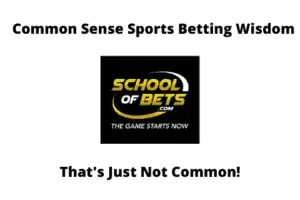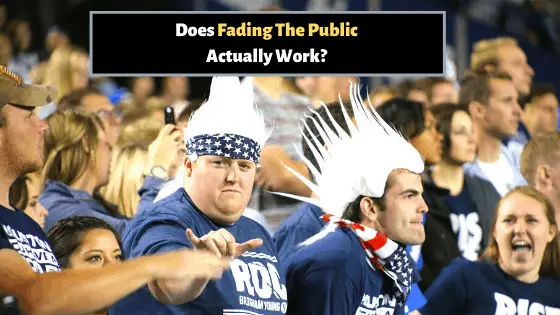Sport betting is no easy ride. Turning an interest or love of sports into a tidy profit takes more than just throwing some hard earned down and waiting for it to multiply. Since bookmakers started taking action on sports, bettors have attempted to develop systems that win and keep on winning. One of the long standing methods is fading the public.
What is fading the public? A betting philosophy based on the belief that the public consistently lose and therefore betting in a contrary style will be profitable. An example of fading (veering away), would be betting on the opposite side of a point spread after public money had moved it heavily in one direction. Fading the public can be profitable if used correctly.
The Theory Behind Fading The Public
The theory in essence is so simple. Observe the consensus approach of the public towards a particular sports betting market and assuming they are, on the whole, losers, bet against them.
After all sports bettors tend to erode their bankroll over time and sportsbooks seemingly make endless profit. Why wouldn’t it make sense as a bettor to simply follow the lead of the successful bookmakers and bet against the hapless gambling public.
For example let’s imagine in the NFL the LA Rams are playing the 49ers and begin the week as a 3.5 point favorite. Throughout the week the public money begins to flow heavily in favor of the Rams and by the morning of the game they are now 5.5 point favorites. A bettor who is ‘fading the public’ will jump on board the 49ers plus the points, with the thought that at the new line they represent a value pick. Sounds plausible.
This is a very common approach to betting and it has to be said, has been used with some success. But does it pay off in the long term?
Does Fading the Public Actually Work?
The short answer is No. At the same time it is also Yes. Here is why:
One of the all time great stock market investment quotes comes from the ‘Oracle of Omaha’ Warren Buffett. When referring to his contrarian style of investing he famously stated:
“We simply attempt to be fearful when others are greedy and to be greedy only when others are fearful”
Warren Buffett
This one simple statement highlighted Buffett’s contrarian investing nature. He seems to be saying here that when other investors are pouring into a ‘sure thing’ he senses danger and remains on the sidelines. When investors are pulling their money out of the markets he sees bargains appearing and snaps them up and great prices.
It would seem logical to assume that Buffet is in fact ‘fading the public’. That is, knowing the public are a poor guide of the real worth of an investment, he simply does the opposite. The reality is Warren Buffett and his partner Charlie Munger have not built their holding company Berkshire Hathaway into a Multi-Billion dollar money making machine by following such a simplistic approach in isolation.
Yes, they absolutely do fade the public with a great deal of success, just not all the time. For instance Berkshire Hathaway revealed in May 2019 that it was purchasing Amazon Stocks. This is after the Amazon Stock Price had seen exponential growth over the preceding decade. If Buffett was a 100% contrarian he would never be buying Amazing stocks at those apparently lofty prices. He wasn’t fading the public he was jumping on the bandwagon!
The flipside to the Amazon purchase is Berkshire Hathaway’s investment of $600 million into Gillette Inc in 1986. Gillette’s stock price had taken a hit from the introduction of the disposable razor. Instead of following the crowd and investing in low margin disposable razor companies, Buffett took a huge stake in Gillette. Three years later Gillette released the sensor razor and the rest is history. Fading the public paid monster dividends on this occasion.
The very same logic applies to betting on sports betting. Fading the public is a worthwhile betting style if the bettor is able to selectively choose opportune moments to jump on public overreaction and grab great value on the opposite side to the flood of money.
Betting the Point Spread? Here is how to win more often!
When Has Fading the Public Worked?
Each and every season US sportsbooks post over/under win total bets for college football teams. Patriotic money flows in, often towards the over, because bettors love the idea of having a wager on their alma mater and riding it all season long.
In August of 2019 Fanduel sportsbooks most popular season wins total bet was on the Syracuse Orange to hit the overs in the ACC. Initially the line opened at 5 wins. Over the course of a few weeks it was bet all the way up to 7.5 and the odds were juiced to -150. Perhaps the 5 was too low but the 7.5 is an almighty reaction to that low number and at a terrible price. ‘Fading the public’ here demands that the under 7.5 be taken. Not a blind bet but a tactical play against the tide. Its very much like shorting a stock knowing that in all likelihood investor sentiment has carried it too far beyond its real price.
NOTE: At the time of writing the season opener has not been played and therefore whether Syracuse actually covers the 7.5 remains to be seen. Certainly when I think of ‘fading the public’ this is exactly the kind of situation I am looking for.
When it all boils down fading the public is essentially a means to getting a super good price or an advantageous point spread number. As money comes for one side of the market, the surge will hopefully push the points spread number out, or in the case of the moneyline, increase the odds.
A bettor who fades the public is waiting for this movement and pouncing when the price is right. The bottom line is they must believe the new price or line actually represents value. If they just fade the public blindly then many times they will misstep.
“Price is what you pay. Value is what you get.”
Warren Buffett
Warren Buffett
Another pearl of wisdom from the great Warren Buffett. Although he was talking about stocks, he may as well have been talking about sports betting. This is why I dislike the term fading the public. Really the strategy, if used successfully, is more about reading the public, waiting for an opportunity and buying at a price that represents value. That is, you are getting more than what you paid for! A total bargain!
The bet may not always win (nothing is a sure bet) but the value achieved means that when the wins come, they make up for the losses.
“If you wait by the river long enough, the bodies of your enemies will float by”
Sun Tzu
Sun Tzu
A famous quote from 5th century Chinese military strategist Sun Tzu which points to the fact that in battle, patience is a weapon. It is the same in sports betting. Opportunities to fade the public are not always around but over time they appear. Picking and choosing your moment is the true skill in fading the public.
If you believe the public will ‘come after’ a market then your best bet is to wait, fade their move, and snatch the bargain when it appears. Perhaps it’s a bit extreme to think of it as their bodies floating down the river but you are using their reaction and potential overreaction to win the battle.
Become a more successful sports bettor in no time! Find out how here.
When Fading the Public Has Not Worked?
In the lead up to the 2019 Super Bowl between the LA Rams and the New England Patriots, sportsbooks opened the Rams as a 1 point favorite. The two week gap between the Championship games and the Super Bowl gives bettors plenty of time to wager big bets and subsequently the line to move.
In this case the line moved very quickly as the darlings of the public, the Patriots, attracted a flood of money with the +1 start. Very quickly that line swung around and at times pre-game, the Patriots were as short as -2.5 favorites. Sure enough the Patriots went on to dominate the final quarter in a low scoring affair and win by 10 points. The opening -1 on the Rams was crushed, along with the peak of +2.5.
The bettors who intentionally faded the public on this occasion were burned. Grabbing +2.5 on the 13-3 regular season Rams would seem like a good bet, especially up against the 11-5 regular season Pats. It didn’t work out. To be honest if the same situation presented itself again tomorrow I would take +2.5 on the Rams. Just because a bet didn’t work out doesn’t mean the strategy is completely flawed.
Why Consensus Picks Can Be Misleading?
The consensus pick is simply the side of the market where the greater percentage of the bettors have placed their money. The figure is more misleading than it is useful, however it is not a complete waste of time.
The issue with consensus picks is that they don’t give information on the bet size and/or what price or number those bettors actually bought in at. For instance let’s look at Week 1 of the 2019/20 NFL season. In the San Francisco 49ers @ Tampa Bay Buccaneers match-up, 86% of the bettors had taken the 49ers against the spread at the time of writing. The problem is the opening line had San Francisco at +2.5 and they had now been bet in to +1. Many of the consensus bettors probably bought at the +2.5, +2 or +1.5 instead of the +1 on offer now. Therefore the consensus is misleading.
This type of misleading data is much like the previous spin data on display at the roulette wheel in pretty much all casinos. It matters not what has happened before, you can only bet on what is about to happen. The data is just presented to mislead. In the cases where bettors simply bet on a market because everyone else has, then not only are they not doing their due diligence they are receiving a terrible price.
Don’t forget, the general consensus at one time was that the world was the centre of the universe, that cholera was caused by bad air and that the continents never shifted. Consensus can be wrong. For better or worse fading the public dines out on this belief.
How to make your bonus bets pay dividends!
Beware the Reverse Line Movement (RLM)
Reverse line movement (RLM) occurs when, despite public consensus and weight of money coming hard for one side of a market, the line actually moves in the other direction. This is usually a sign that some known profitable bettors (sharps) have bet on the less popular side and the books put more credence in their bets than the public. The sportsbooks react accordingly and for the casual observer the line moves in the reverse direction to what was expected.
Some betting strategists use reverse line movement as a strong indicator to follow along and bet with the sharps. Sounds super insightful. Nope. It is just fading the public, only on this occasion the books are onto the tactic. More than likely the value has already been snapped up by the sharps and the reverse line chasers have missed the boat.
As a bettor, if you are paying an agency to receive reverse line movement alerts, not only have you most likely missed the best value, you are also paying for the privilege. Sounds like an unprofitable tactic to me.
However if you see the consensus is well in favor of one side and the line is not budging you may be able to sniff out a reverse line movement situation building and essentially ‘fade the public’ before the reverse line movement snatches all your value. Instead of following sharps, become one.
What Bet Types are Favorable to Fading the Public?
Clearly the Point Spread is a popular market to attempt fading the public. Line movements are clear and evident and easy to track. As already discussed public sentiment and weight of money can shift these lines and fading opportunities can arise. College sports are particularly susceptible to this.
Over/Under totals work in a similar way except that the bias is often not as emotive. There is a belief that in prime time games the over is favored by the recreational bettor as they prefer to see points scored. Perhaps fading the public is more about letting the points total line creep up pre-game and take the under close to start time.
The Moneyline works slightly differently. This is in fact where I personally look most for fading opportunities in professional sports. By that, I mean opportunities to ‘buy’ a good price due to the emotive betting of recreational bettors.
The entrenchment of salary caps, free agency and drafts in pro sport has served to even out many competitions to the point where a win record of 75% (or even less) is enough to top a division or conference. Yet teams who are the darling of the public, with large fan bases will attract huge money, particularly if they are believed to be having a good season. This results in value as they are destined to lose their fair share.
Take for instance the rivalry between the Green Bay Packers, who have wide national and international appeal, and the Detroit Lions, who are less fashionable and much more a one city team. It is conceivable that regardless of the team’s situation at any one point in time the Packers will be slightly shorter than they should be in that match up. Keep an eye out for this type of bias, weigh up the circumstances and don’t be afraid to take the less popular option.
The Moneyline value also tends to favor the ugly duckling. The team that gets the job done but is perennially under the radar and out of the media spotlight. Ugly ducklings often play and win ugly. When they match up against a fan favorite they tend to not get the respect they deserve and fading the public is always an option.
The Game Starts Now!
Fading the public is a dangerous term because it conjures the wrong idea in bettors minds and makes it seem as though simply betting against tide is profitable. As a blanket strategy it leads to only one outcome: bankroll heartache.
However, call it what you will, the concept of letting public sentiment take hold and change betting markets allowing you to grab the spot you like is a worthwhile strategy. This should be a central component of your sports betting repertoire. If refined over time it just may be the ticket to profitability.




